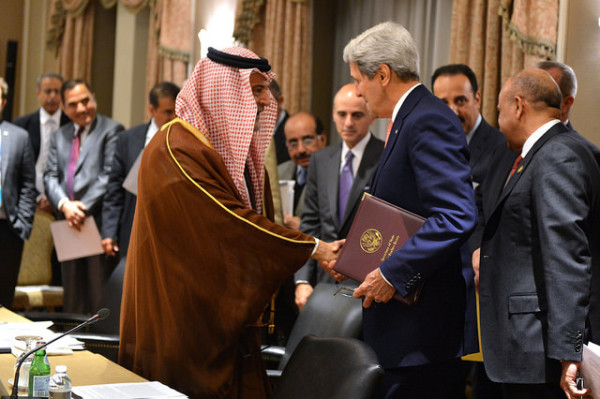by Mark N. Katz
The states of the Gulf Cooperation Council (GCC)—Saudi Arabia, Kuwait, Bahrain, Qatar, the United Arab Emirates (UAE) and Oman—are frustrated. Four of them—Saudi Arabia, Kuwait, Qatar and the UAE—have vast quantities of petroleum. All of them are monarchies. And all of them are militarily weak. Thus, ever since the Cold War (and even before the formation of the GCC in 1981), the states that formed the GCC have looked to the United States for protection.
Yet the states of the GCC believe they have good reason to fear for their security. Their rival, Iran, is actively supporting Shia allies in Iraq, Syria, Lebanon, and Yemen. In addition, while the Sunni-jihadist Islamic State (ISIS or IS) is virulently anti-Shia and anti-Iranian, it could soon pose a security threat to Saudi Arabia and other GCC states if it is not contained.
The GCC’s fear that Washington is not as strongly committed to its security as it was in the past was heightened by the Obama administration’s withdrawal of American forces from Iraq in 2011 and its unwillingness to take military action against the Iranian-backed Assad regime in Syria last year. While the GCC states welcome (and some have even joined) the US-led bombing campaign against IS, they fear that it will not suffice to stop the group, much less defeat it.
The GCC states also fear that what they see as decreased American interest in their security does not just reflect the Obama administration’s policy, but that it will also be the policy of subsequent administrations—Republican or Democrat. They fear that the North American “shale revolution” that has resulted in greatly increased American oil production is leading to a perception in Washington that the US and its Western allies are no longer so dependent on Gulf petroleum, and thus the security of these states will become a less vital concern for the United States. In addition, they worry that if the Obama administration’s efforts to improve US-Iranian relations prove successful, the resulting expanding business ties between the two countries would lead to future administrations giving less priority to Gulf Arab concerns about Iran.
The views of the GCC states on security matters, it must be noted, are not completely uniform. Oman, unlike the others, has relatively good relations with Iran. And Qatar, unlike the others, supported Egypt’s Muslim Brotherhood-led government—which Doha saw as moderate but the others regarded as extremist—before its ouster by the Egyptian military in 2013. All the GCC governments, though, have relied on the US as their primary protector up to now. So they are all frustrated by what they see as declining American interest in helping them.
As a result, some voices in the Gulf have called for the GCC to turn to other powers for support. The European Union, Russia, China, and India have all been mentioned. It is not clear, though, that any of them are willing or able to play this role. The recent French intervention in Mali notwithstanding, the EU states do not seem willing to act as defenders of the GCC without American leadership—or perhaps even with it.
Russia would like to play a more active role in GCC security, but is not willing to sacrifice its close ties to Iran (or Israel) for the sake of the GCC. Nor does Moscow have the desire to engage in sustained military activity outside the former Soviet Union. Ukraine is a higher priority for it anyway.
While China and India have become more assertive in their immediate neighborhoods, both appear to prefer that America continue to protect the GCC states, which supply them with oil, rather than undertaking this expensive task themselves. And there are no other candidates besides the EU, Russia, China, and India that could conceivably replace the US as the primary great power protector for the GCC.
Some in the GCC, though, do not appear to recognize this. Others do, but seem to hope that talking about turning to other great powers might motivate Washington to do more for the Gulf for fear of losing influence there to a rival. There is also very little appreciation, or even tolerance for the idea that an Iranian-American rapprochement could actually benefit the GCC through the increasing American ability to moderate Iranian behavior by offering Tehran carrots instead of just wielding sticks.
Whether the Obama administration’s hopes for an Iranian-American rapprochement will come to fruition, of course, is highly uncertain. But even if they do, neither Europe, Russia, China, nor India will react by scaling back their own ties to Iran in order to supplant American influence in the GCC. Nor will any of them act more forcefully than the US against the threat posed by the Islamic State. Thus, however frustrated the GCC states might be with Washington, they have little choice but to rely upon it for protection.






GCC should look and reflect inwards, like Iran did for the last 30 years. The GCC countries have a significant population together, and enormous wealth. They can look to educate their population, create indigenous industry and services.
There is no threat other than the internal threat of disintegration to the GCC states. Iran has not done anything to these states comparative to the flames of war and hatred that they have fanned. Be it by supporting Pakistan and its militants, or Israel and its war machine or Jordan and its dictator kingdom. The GCC sheiks are more scared of the internal threat to their monopolistic power that will come crashing down, than they are to any external threat. Iran as a boggy man was great as it helped create fear in the eye of Americans and it created a mechanism for GCC to pull the wool over their populations eye.
Increasingly it looks like that Iran will be moving towards the west, especially once the Khamanei dictator is gone. Iran pivoting to the west will put these Sheiks back to reality.
I would say America should tell them reform and open up or else sit and fester.
The name is persian gulf not “Gulf”